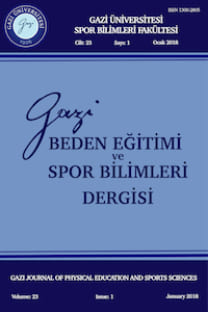SPOR ORGANİZASYONLARINDA GÖNÜLLÜ ÇALIŞMA MOTİVASYONLARI ÖLÇEK GELİŞTİRME ÇALIŞMASI
Türkiye'de son dönemde
sayısız büyük spor organizasyonu düzenlenmiş ve düzenlenecektir. Ancak, bu tip
organizasyonların işleyişinde çok önemli bir yer tutan gönüllü çalışabilecek
kişileri belirlemek için yapılmakta olan çalışmalar yetersiz kalmaktadır. Daha
kalifiye ve çok sayıda gönüllü çalışanı organizasyonlara çekebilmek için
kişileri gönüllü çalışmaya motive edebilecek ya da kişileri gönüllü çalışmaktan
alıkoyabilecek etkenleri belirlemek çok önemlidir. Bu doğrultuda, bu çalışmanın
amacı kişileri gönüllü çalışmaya motive edebilecek ve kişileri gönüllü
çalışmaktan alıkoyabilecek etkenleri saptamaya yönelik Türk toplum yapısına
uygun bir ölçek geliştirmektir. Çalışmaya 4 farklı üniversitede eğitim görmekte
olan 770 kişi katılım göstermiştir. Yapılan faktör analizi sonuçları
"Gönüllü Çalışma Güdüleri" ölçeğinin 6 alt boyutta beliren 22
maddeden oluşmakta olduğunu ve kişileri gönüllü çalışmaya motive edebilecek
etmenleri ölçmek için gerekli geçerlilik ve güvenirlilik parametrelerine sahip
olduğunu göstermektedir. Diğer yandan, "Gönüllü Çalışmama Sebepleri"
ölçeğinin 6 alt boyutta beliren 20 maddeden oluşmakta olduğu ve kişileri
gönüllü çalışmaktan alıkoyabilecek etmenleri ölçmek için gerekli geçerlilik ve
güvenirlilik parametrelerine sahip olduğu belirlenmiştir.
Anahtar Kelimeler:
GÖNÜLLÜLÜK, SPORTİF ORGANİZASYONLAR
MOTIVES IN VOLUNTEERISM IN SPORTING EVENTS: SCALE DEVELOPMENT STUDY
Numerous numbers of big sporting events have
been held and will be hosted in Turkey. However, insufficient number of studies
related with the determination of volunteers, who are very important for such
big organizations, have been carried out in Turkey. It is very important to
ascertain the motives and the barriers of volunteerism. To be able to influence
on better qualified and more people to volunteer work in sport organizations
Therefore, the purpose of this study was to develop a scale for to measure the
motives and barriers of volunteerism which is acceptable for the Turkish
culture. 770 university students from 4 different universities participated in
the study. The results of factor analysis indicated that "Motives of
Volunteerism" scale was composed of 22 items under 6 factors and possessed
the psychometric properties to accurately and reliably measure the underlying
factors that can motivate people to work voluntarily in big sporting events. In
addition, results of factor analysis showed that "Barriers of
Volunteerism" scale was composed of 20 items under 6 factors and possessed
the required psychometric properties to accurately and reliably measure the
underlying factors that can result in unwillingness to work voluntarily in big
sporting events.
Keywords:
VOLUNTEERISM, SPORTING EVENTS,
___
- Auld, C. (1999). A Model for Pre-Olympic Volunteer Involvement: A Case Study of Queensland (Australia). Volunteers, Global Society and the Olympic Movement Symposium, Lausanne.
- Boraas, S. (2003). Volunteerism in the United States. Monthly Labor Review, August, 3-11.
- Clary, E. G., Ridge, R. D., Stukas, A., Snyder, M., Copeland, J., Haugen, J. & Miene, P. (1998). Understanding and Assessing the Motivations of Volunteers: A Functional Approach. Journal of Personality and Social Psycology, 74 (6), 1516-1530.
- Clary, E., Snyder, M., & Stukas, A. (1996). Volunteer's Motivations: Findings From a National Survey. Nonprofit and Voluntary Sector Quality, 25 (4), 485-505.
- Clary, E.G. & Snyder, M. (1999). The Motivations to Volunteer: Theoretical and Practical Considerations. Current Directions in Pschological Science, 8 (5), 156-159.
- ISSN: 1300-2805
- Yayın Aralığı: Yılda 4 Sayı
- Başlangıç: 1996
- Yayıncı: Gazi Üniversitesi
Sayıdaki Diğer Makaleler
BEDEN EĞİTİMİ VE SPOR YÜKSEKOKULU ÖĞRENCİLERİNİN GENEL ÖĞRENME STRATEJİLERİNİ KULLANMA DÜZEYLERİ
MARKA TUTUM ÖLÇEĞİ (MTÖ) GEÇERLİK VE GÜVENİRLİK ÇALIŞMASI
ERCAN POLAT, ÜNAL KARLI, M. SETTAR KOÇAK, SUAT KARAKÜÇÜK
Bariş SÖZERİ, Özkan ALTUN, Mecide TÜZÜN, Feza KORKUSUZ, Aysel ATIMTAY
SPOR ORGANİZASYONLARINDA GÖNÜLLÜ ÇALIŞMA MOTİVASYONLARI ÖLÇEK GELİŞTİRME ÇALIŞMASI
